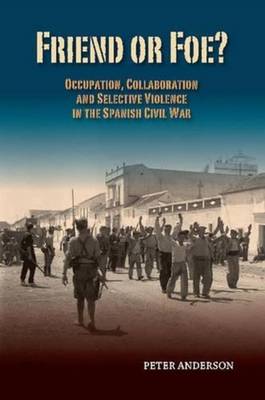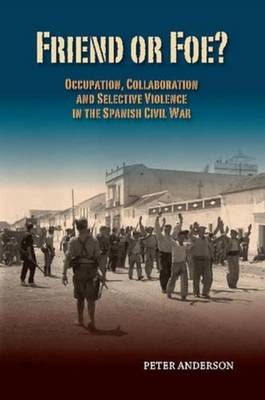
- Retrait gratuit dans votre magasin Club
- 7.000.000 titres dans notre catalogue
- Payer en toute sécurité
- Toujours un magasin près de chez vous
- Retrait gratuit dans votre magasin Club
- 7.000.0000 titres dans notre catalogue
- Payer en toute sécurité
- Toujours un magasin près de chez vous
Friend or Foe?
Occupation, Collaboration and Selective Violence in the Spanish Civil War
Peter Anderson
132,95 €
+ 265 points
Description
'Today with the Red Army captive and disarmed, the Nationalist [nacionales] troops have achieved their final military objectives. The war is over.' With these two sentences, on 1 April 1939, General Franco announced that his writ ran across the whole of Spain. His words marked a high point for those who had flocked to Franco's side and since the start of the Civil War in July 1936 had carried out what they regarded as the steady occupation of the country. The history of this occupation remains conspicuous by its absence and the term occupation lies discredited for many historians. The danger of leaving the history of the occupation unexplored, however, is that a major process designed to control the conquered population remains in the shadows and, unlike many other European countries, the view of occupation as an imposition by outsiders remains unchallenged. Friend or Foe? explores how Francoist occupation saw members of the state and society collaborate to win control of Spanish society. At the heart of the process lay the challenging task in civil war of distinguishing between supporter and opponent. Occupation also witnessed a move from arbitrary violence towards selecting opponents for carefully graded punishment. Such selection depended upon fine-grained information about vast swathes of the population. The massive scale of the surveillance meant that regime officials depended on collaborators within the community to furnish them with the information needed to write huge numbers of biographies. Accordingly, knowledge as a form of power became as crucial as naked force as neighbours of the defeated helped define who would gain reward as a friend and who would suffer punishment as a foe.
Spécifications
Parties prenantes
- Auteur(s) :
- Editeur:
Contenu
- Nombre de pages :
- 272
- Langue:
- Anglais
- Collection :
Caractéristiques
- EAN:
- 9781845197940
- Date de parution :
- 24-05-16
- Format:
- Livre relié
- Format numérique:
- Genaaid
- Dimensions :
- 147 mm x 229 mm
- Poids :
- 521 g

Les avis
Nous publions uniquement les avis qui respectent les conditions requises. Consultez nos conditions pour les avis.






